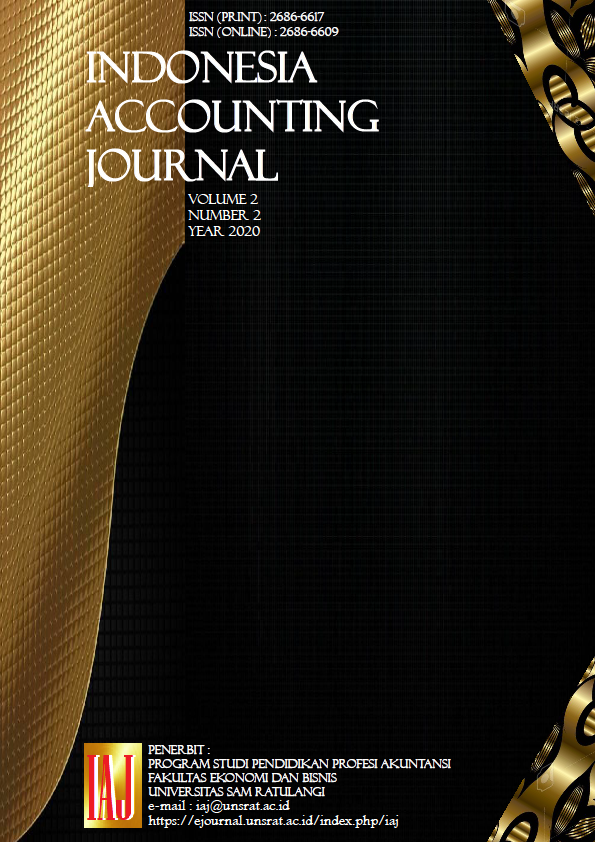Pengaruh kompetensi aparatur desa, sistem pengendalian internal, pemanfaatan teknologi informasi dan partisipasi masyarakat terhadap akuntabilitas pengelolaan dana desa
DOI:
https://doi.org/10.32400/iaj.29261Keywords:
competency, controlling, technology, participation, accountabilityAbstract
Accountability of village funds management is the responsibility of the village officers. Village officers should have good competency. Its can help village officer to manage village funds. Another thing in managing village funds besides of good internal controlling system is the use of information technology and public participation. This study aims to know the effect of competency of village officers, internal controlling system, use of information technology, and public participation on the accountability of village fund management. This study uses a quantitative approach for hypothesis testing. The instrument of this study is in the form of questionnaires and filled by respondents. The population in this study is all village officers in Sub-District of Grogol at Regency of Sukoharjo. The sampling technique of this study is purposive sampling with 40 respondents as the sample and analyzed by multiple linear regression. This study finds that the competency of village officers and public participation are significant on accountability of village funds management. Also, this study finds that internal controlling system and use of information technology are insignificant on accountability of village funds management.
References
Atiningsih, S., & Ningtyas, A. C. (2019). Pengaruh kompetensi aparatur pengelola dana desa, partisipasi masyarakat dan sistem pengendalian internal terhadap akuntabilitas pengelolaan dana desa. Jurnal Ilmu Manajemen dan Akuntansi Terapan, 10(1), 14-25. http://dx.doi.org/10.36694/jimat.v10i1.182
Aulia, P., Agusti, R., & Julita (2018). Pengaruh kompetensi aparatur pengelola dana desa, komitmen organisasi pemerintah desa, pemanfaatan teknologi informasi, dan partisipasi masyarakat terhadap akuntabilitas pengelolaan dana desa di Kabupaten 50 Kota. JOM FEB (Jurnal Online Mahasiswa Fakultas Ekonomi Bisnis), 1(1), 1-15. https://jom.unri.ac.id/index.php/JOMFEKON/article/view/21729
Budiana, D. A., Said, D., & Nursini. (2019). The effect of village device competencies and internal control system on accountability of village management. Scientific Research Journal, VII(1), 10-20. www.scirj.org/jan-2019-paper.php?rp=P0119599
Dewi, N. K., & Gayatri. (2019). Faktor-faktor yang berpengaruh pada akuntabilitas pengelolaan dana desa. E-Jurnal Akuntansi Universitas Udayana, 26(2), 1269-1298. https://doi.org/10.24843/EJA.2019.v26.i02.p16
Donaldson, L., & Davis, J. (1991). Stewardship theory or agency theory: CEO governance and stakeholder returns. Australian Journal of Management, 16(1), 49-66. https://doi.org/10.1177/031289629101600103
Ghozali, I. (2011). Aplikasi analisis multivariate dengan program SPSS. Semarang: BP Universitas Diponegoro.
Hery. (2014). Pengendalian akuntansi dan manajemen. Indonesia: Kencana.
Kaihatu, T. (2006). Good Corporate Governance dan penerapannya di Indonesia. Journal Manajemen dan Kewirausahaan, 8(1), 1-9. http://jurnalmanajemen.petra.ac.id/index.php/man/article/view/16505
Lestari, A. K. D., Atmadja, A. T., & Adiputra, I. M. P. (2019). Membedah akuntabilitas praktik pengelolaan keuangan Desa Pakraman Kubutambahan, Kecamatan Kubutambahan, Kabupaten Buleleng, Provinsi Bali (Sebuah studi interpretif pada organisasi publik non pemerintahan). Jurnal Ilmiah Mahasiswa Undiksha, 2(1), 1-12. https://ejournal.undiksha.ac.id/index.php/S1ak/article/view/2253
Mutmainah, I., & Pramuka, B. A. (2017). Penerapan akuntabilitas pengelolaan dana desa dan Sistem Pengendalian Intern Pemerintah (SPIP) di Kecamatan Kedungwuni Kabupaten Pekalongan. Jurnal Ekonomi, Bisnis, dan Akuntansi (JEBA), 19(4), 1-12. http://www.jp.feb.unsoed.ac.id/index.php/jeba/article/view/1104
Noor, J. (2017). Metodologi penelitian: Skripsi, tesis, disertasi, dan karya ilmiah. Jakarta: KENCANA.
Noordiawan. (2006). Akuntansi sektor publik. Jakarta: Salemba Empat.
Nuryanto, H. (2012). Sejarah perkembangan teknologi informasi dan komunikasi. Jakarta: PT Balai Pustaka (Persero).
Priyatno, D. (2014). SPSS 22 pengolahan data terpraktis. Yogyakarta: ANDI Yogyakarta.
Sugiarti, E., & Yudianto, I. (2017). Analisis faktor kompetensi sumber daya manusia, pemanfaatan teknologi informasi dan partisipasi penganggaran terhadap akuntabilitas pengelolaan dana desa. Profesionalisme Akuntan Menuju Sustainable Business Practice (PROCEEDINGS), 580-590. https://repository.widyatama.ac.id/xmlui/handle/123456789/8578
Sugiyono. (2008). Metode penelitian bisnis. Bandung: CV. Alfabeta.
Sutrisno, E. (2017). Manajemen Sumber Daya Manusia. Jakarta: Kencana
Umaira, S., & Adnan. (2019). Pengaruh partisipasi masyarakat, kompetensi sumber daya manusia, dan pengawasan terhadap akuntabilitas pengelolaan dana desa (Studi kasus pada Kabupaten Aceh Barat Daya). Jurnal Ilmiah Mahasiswa Ekonomi Akuntansi (JIMEKA), 4(3), 471-481. https://doi.org/10.24815/jimeka.v4i3.12580
Wafirotin, K. Z., & Septiviastuti, U. (2019). The effect of transparency, community participation, and accountability on management of village funds in Ponorogo Regency. Jurnal Ilmiah Bidang Ilmu Ekonomi, 14(1), 31-44. https://doi.org/10.24269/EKUILIBRIUM.V14I1.1527
Warsita, B. (2008). Teknologi pembelajaran: Landasan dan aplikasinya. Jakarta: Rineka.
Widyatama, A., Novita, L., & Diarespati. (2017). Pengaruh kompetensi dan sistem pengendalian internal terhadap akuntabilitas pemerintah desa dalam mengelola Alokasi Dana Desa (ADD). Berkala Akuntansi dan Keuangan Indonesia, 2(2), 1-20. http://dx.doi.org/10.20473/baki.v2i2.4762
Downloads
Additional Files
Published
Issue
Section
License
The articles published in Indonesia Accounting Journal are licensed under Creative Commons Attribution 4.0 International License with authors as copyright holders.
Â

This work is licensed under a Creative Commons Attribution 4.0 International License.
Â
Under this license then authors free to:
- Share — copy and redistribute the material in any medium or format.
- Adapt — remix, transform, and build upon the material for any purpose, even commercially.
Under the following terms :
- Attribution — You must give appropriate credit, provide a link to the license, and indicate if changes were made. You may do so in any reasonable manner, but not in any way that suggests the licensor endorses you or your use.
- No additional restrictions — You may not apply legal terms or technological measures that legally restrict others from doing anything the license permits.
Notices:
- You do not have to comply with the license for elements of the material in the public domain or where your use is permitted by an applicable exception or limitation.
- No warranties are given. The license may not give you all of the permissions necessary for your intended use. For example, other rights such as publicity, privacy, or moral rights may limit how you use the material.


